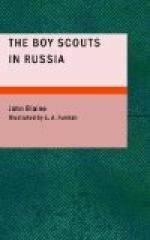“No, that is true,” said Suvaroff. He spoke thoughtfully. It was plain that Fred’s argument was making an impression on him. “I have heard something of your affair with Mikail. I shall look into that. Eh—I don’t know just what to do!”
“Let us stay!” pleaded Boris. “We will be careful, and we know now just what dangers we must avoid.”
“I think we shall be back here, in force, before the week is out,” said his father, after a moment’s reflection. “Very well, you shall stay! It is true that you may be of the greatest service. I have not the right to consider personal matters when the welfare of Russia is at stake.”
It was light by now. In curious contrast to the shambles of the garden and the disorder of the house, its windows shattered by bullets, its furniture broken and draperies torn in the swift conflict that had followed the appearance of the Cossacks, roosters were crowing outside and birds were singing. General Suvaroff gave a sharp order; subordinates passed it along. A bugle sounded, and, five minutes later, after the general had said good-bye to the two scouts, the Cossack raiders rode away. They were strung out in a long column along the road. As they passed through the village Fred and Boris, watching from an upper window of the abandoned parsonage, saw the villagers watching. Boris had a powerful field glass, and through this he and Fred could see the very faces of the watching Germans. Hatred and fear mingled in the looks they sent after the invaders of their country.
“One can’t blame them,” said Fred, with a shudder. “War’s rather ghastly, isn’t it, Boris?”
He looked down into the garden, and Boris’s eyes followed his.
“Yes,” said the Russian. “That’s the ugly part of it. It’s all ugly. But sometimes war must come, it seems to me. We in Russia have never wanted to make war. We have fought because we were forced to fight. I think that is what history will say of us in this war.”
“They are not going toward Russia,” said Fred, looking after the raiders, who were melting into the landscape now. “Their road seems to be due west.”
“They must ride in a long circle, I suppose,” said Boris. “If they went straight back, they would run right into the Germans. There must be a lot of the enemy between us and the Russian lines—their main body, you see. And my father won’t want to fight. His object is to get back with as many men as possible. It would be useless to send a thousand Cossacks against an army corps.”
“Oh, of course! It’s wonderful to think of how they got here, Boris, riding right through the enemy’s country! It’s like the work cavalry did on both sides in our Civil War. They used to get behind the enemy’s lines and cut telegraph wires and railways all the time.”
In the village, there were now more signs of life. As the Cossacks rode by, the street had been empty, but now men and women were coming out furtively. They began to come toward the parsonage.




